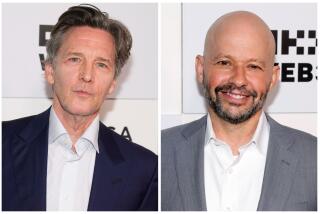Leo McCarthy, 76; Democrat served as lieutenant governor, Assembly speaker
- Share via
Leo T. McCarthy, former lieutenant governor of California and a durable figure in the state’s rough-and-tumble Democratic Party politics for more than a generation, died Monday at his home in San Francisco after a long illness, family members said. He was 76.
With a distinctive smile that could dissolve from warm and inviting to icy and menacing with barely a twitch of muscle, McCarthy was most thoroughly -- and memorably -- effective as a hard-driving, ramrod-straight, take-no-prisoners statehouse insider. He served as Assembly speaker from 1975 to 1982, an era before term limits when legislative power was accrued slowly and only by those with uncommon backroom acumen and sharp partisan elbows.
House Speaker Nancy Pelosi, noting McCarthy’s passing, said in a statement that “as speaker and lieutenant governor, Leo promoted a values-based agenda to educate our children, grow our economy and protect our environment.”
“He was a great champion for justice, and he was a dear friend and purposeful mentor to me,” Pelosi said.
He may be most widely remembered, though, for his three terms as lieutenant governor, elected in 1982, 1986 and 1990. Under any circumstances, the position tends to serve as a launching pad more than a substantive office, but in McCarthy’s case, his room to maneuver was reduced by the fact that he served all 12 years under Republican chief executives.
McCarthy saw himself as a champion of Democratic causes and underdog constituencies, including the environment, healthcare and education. But on the larger stage of California politics, where celebrity was ascendant, the two sides of the coin held that McCarthy was either remarkably reserved in public or just plain bland. Perhaps closer to the truth, he was single-mindedly intense, even righteous, about the causes that engaged him -- a “heat-seeking missile,” as one colleague called him.
“He had a big heart and was widely admired. He was in politics for the right reasons and people understood that,” said former Gov. Gray Davis, a fellow Democrat. “He was one of the most decent people I met in 30 years of public life.”
Twice McCarthy tried to break into the first tier of statewide politics with campaigns for the United States Senate. In 1988, he lost to Republican Pete Wilson, and four years later was beaten in the Democratic primary by Barbara Boxer.
McCarthy was born in Auckland, New Zealand. His family immigrated to San Francisco at the height of the Great Depression and squeezed into a small apartment when McCarthy was 3. He slept on a pull-out sofa. His Irish-born father went on to establish several bars and restaurants, including “McCarthy’s Big Glass.”
The would-be politician embarked on early studies for the priesthood, then served in the Air Force and obtained a degree in history at the Jesuit-run University of San Francisco.
He went on to earn a degree in law and entered politics in 1963, when he was elected to the San Francisco Board of Supervisors.
In 1966, he lost a race for the state Senate. But he rebounded two years later and won a seat in the Assembly. He once likened the legislative arena to the tough streets he had known as a kid in San Francisco’s Mission district.
During an era when Sacramento politics was more closely followed by the news media and the general public, McCarthy grabbed headlines in 1974 when he outfoxed Willie Brown to take over the job as Assembly speaker. This bruising battle among Democrats was repeated again at the end of McCarthy’s legislative career, when he thwarted Assemblyman Howard L. Berman to take over the leadership job.
In the years following, McCarthy reminisced fondly about his tenure as speaker.
“I love it,” he said of the legislative process in a 1992 interview with The Times. “I love the whole challenge of being able to come up with something to deal with a bad economy, or a bad school system or a dirty environment.”
He expressed gusto for the “hardball” of politics and described epic fights of his time as “absolutely great.”
McCarthy was steadfast in his opposition to expanded offshore oil drilling. He led the fight to block the construction of a liquefied natural gas terminal on the California coast. He sponsored sweeping reforms in nursing homes, and he battled against a proposal by Gov. Jerry Brown, a fellow Democrat, to reduce welfare spending for the aged and infirm. In 1978, he became a leading opponent of the ballot measure that kicked off the modern tax revolt in the U.S. -- the famed Proposition 13, which passed and slashed property taxes by more than half.
For all his devotion to public service, McCarthy was an unabashed homebody. Even during the height of his power in Sacramento, he drove home most nights to be with the college sweetheart he married, Jackie, and their four children.
When asked to name his most significant accomplishment, he would reply, “My family.”
After leaving politics, McCarthy established an investment company in San Francisco and, with his wife, also created a family foundation.
He pledged $1 million and helped raise more to endow the Leo T. McCarthy Center for Public Service and the Common Good at the University of San Francisco.
The goal of the center is to expose students to the experiences of those who live in poverty and simultaneously motivate them to enter careers of service.
He is survived by his wife of 51 years, Jacqueline Burke McCarthy; two daughters, Sharon McCarthy Allen and Conna McCarthy Craigie; two sons, Adam and Niall; and 11 grandchildren.
Funeral services are scheduled for 10:30 a.m. Friday at St. Ignatius Church on the campus of the University of San Francisco.
More to Read
Get the L.A. Times Politics newsletter
Deeply reported insights into legislation, politics and policy from Sacramento, Washington and beyond. In your inbox twice per week.
You may occasionally receive promotional content from the Los Angeles Times.










